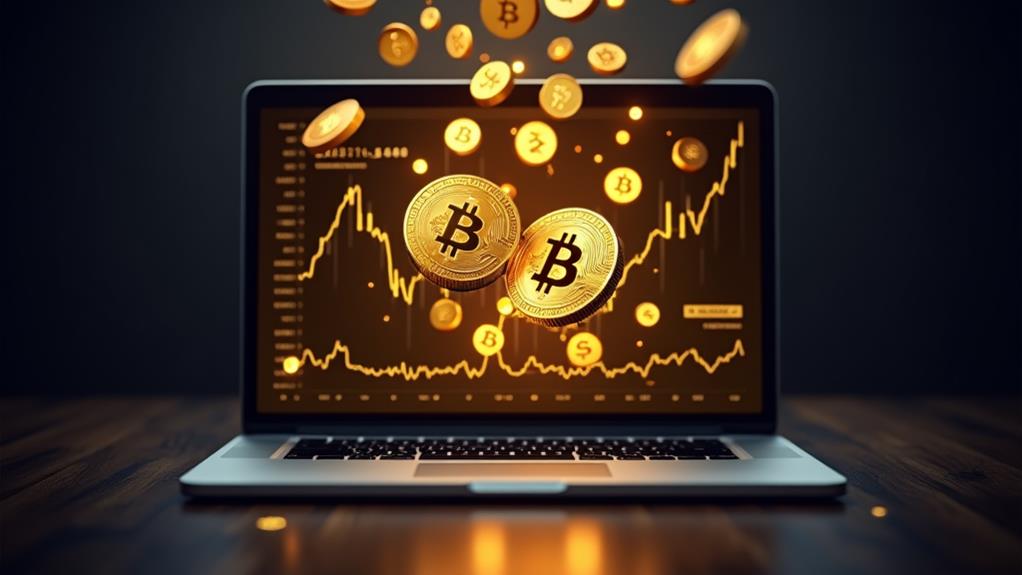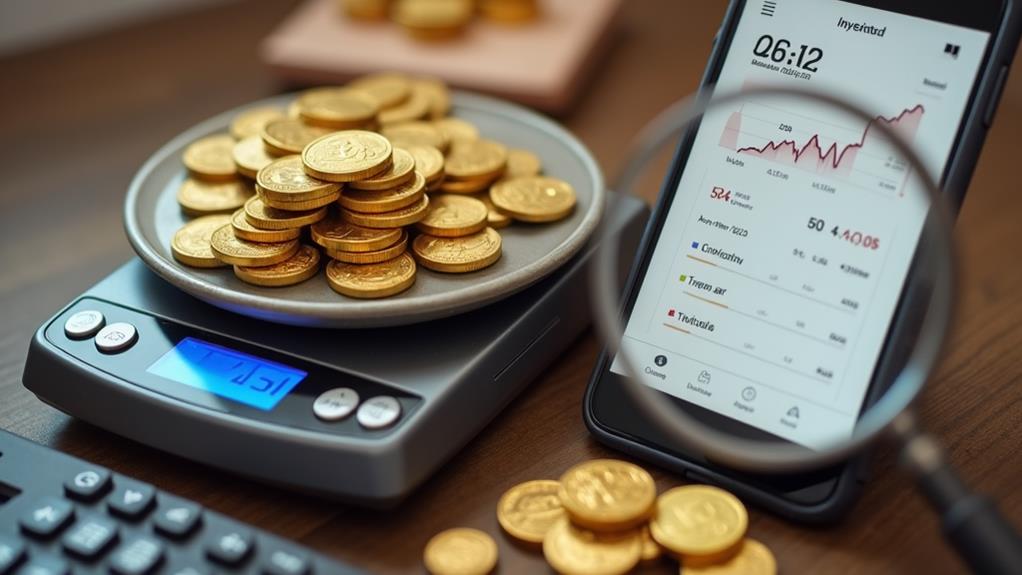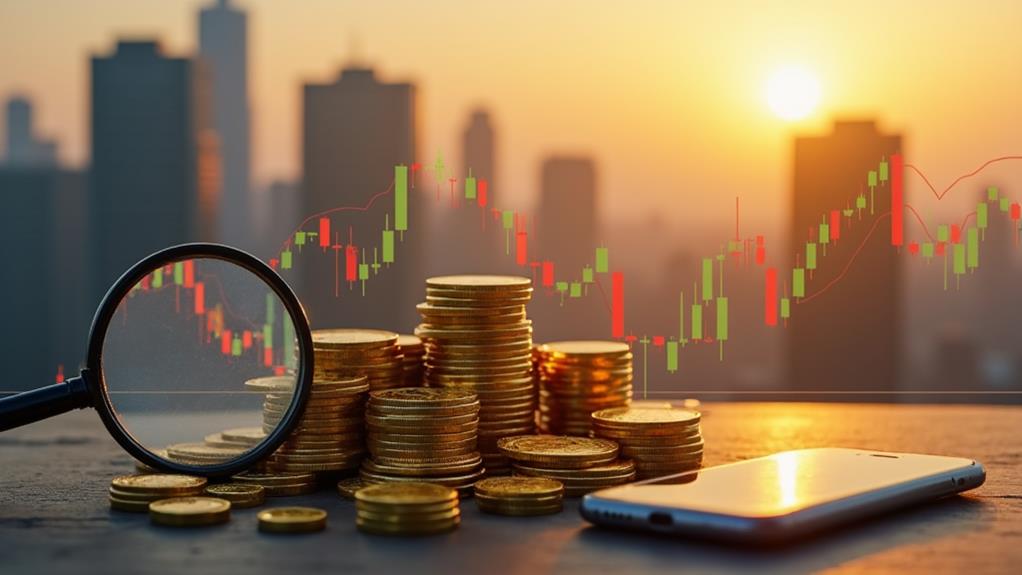As the financial landscape evolves, digital gold investments have emerged as a compelling alternative to traditional precious metal holdings. This modern approach to gold ownership offers unique advantages, but it additionally presents a new set of considerations for investors. To traverse this complex terrain, a systematic evaluation process is vital. By examining fundamental factors such as platform types, security protocols, and cost structures, investors can make informed decisions that align with their financial goals. The following manual will furnish you with the knowledge needed to assess digital gold opportunities effectively, ensuring you're well-prepared to investigate this innovative asset class.
Key Insights
- Research different types of digital gold platforms, including ETFs, online platforms, and blockchain-based offerings.
- Evaluate security measures, regulatory compliance, and auditing processes of potential investment platforms.
- Compare fees, transaction costs, and storage charges across different digital gold investment options.
- Assess liquidity and accessibility by analyzing trading volumes, withdrawal options, and market hours availability.
- Consider market trends, price volatility, and how digital gold fits into your overall investment portfolio strategy.
Understanding Digital Gold

Digital gold represents a modern approach to investing in precious metals, combining the timeless value of gold with the convenience of digital transactions. This innovative investment option allows individuals to invest in gold without physical storage concerns.
Digital gold platforms offer a secure, accessible way to buy, sell, and hold gold assets electronically.
Key aspects of digital gold investments include:
- Liquidity: Easy buying and selling of gold in small quantities
- Security measures: Advanced encryption and storage protocols
- Accessibility: 24/7 trading from anywhere with internet access
- Cost-effectiveness: Lower fees compared to traditional gold investments
While digital gold offers convenience, investors should understand gold investment fundamentals before participating.
Dr. Jane Smith, a financial analyst, advises, "Research reputable platforms, compare fees, and ensure proper security measures are in place before investing in digital gold."
Careful evaluation of these factors can help investors make informed decisions in this evolving market.
Benefits of Digital Gold Investments
Building upon the foundational understanding of digital gold, it is crucial to examine the specific advantages this investment option offers.
Digital gold investments provide several benefits that appeal to modern investors:
- Diversification benefits: Adding digital gold to a portfolio can help spread risk.
- Market transparency: Real-time price tracking and analytics improve decision-making.
- Fractional ownership: Investors can purchase small amounts, increasing accessibility.
- Global market reach: Digital gold can be bought and sold internationally with ease.
These advantages stem from the integration of traditional gold investment with digital technology.
The ability to store digital gold in digital wallets improves security and convenience.
Furthermore, the 24/7 nature of digital markets allows for continuous price monitoring and trading opportunities.
Nevertheless, investors should remain cautious and thoroughly research platforms before committing funds, as the digital gold market is still evolving.
Types of Digital Gold Platforms

Investors exploring the digital gold landscape will encounter various platforms, each offering unique features and investment models.
These digital gold providers typically fall into three main categories:
- Exchange-traded funds (ETFs): Gold ETFs allow investors to buy shares representing physical gold, traded on stock exchanges.
- Online gold platforms: These services enable users to buy digital gold online, often in small quantities, and store it digitally.
- Blockchain-based offerings: Employing cryptocurrency technology, these platforms offer tokenized gold investments.
When evaluating digi gold options, consider factors such as:
- Fees and transaction costs
- Storage and security measures
- Liquidity and ease of selling
- Minimum investment requirements
- Regulatory compliance
As financial analyst John Smith notes, "Carefully assess each digital gold offer to ensure it aligns with your investment goals and risk tolerance."
Security Measures and Regulations
When evaluating digital gold investments, security measures and regulations play an essential role in protecting investors' assets.
Reputable platforms implement strong storage and insurance policies to safeguard physical gold holdings, while adhering to regulatory compliance standards set by financial authorities.
Regular verification and auditing processes ensure the integrity of the platform's operations and the accuracy of gold ownership records, providing investors with additional peace of mind.
Storage and Insurance
Safeguarding digital gold investments requires strong storage solutions and comprehensive insurance coverage. When evaluating digital gold platforms, consider their storage methods and insurance policies for physical gold assets. Reputable providers securely store the gold in high-security vaults, often with third-party custodians. Insurance coverage should protect against theft, damage, and loss.
Key factors to consider:
- Storage costs and how they affect overall investment returns
- Security measures implemented for storing physical gold
- Insurance coverage limits and exclusions
- Accessibility of digital gold holdings and redemption processes
Investors should carefully review the platform's storage and insurance arrangements to ensure their digital gold assets are adequately protected.
While digital gold offers convenience, it's essential to understand how the underlying physical gold is stored and insured. This knowledge helps investors make informed decisions about the safety and security of their investments.
Regulatory Compliance
Regulatory compliance plays a significant role in the security and legitimacy of digital gold investments. The regulatory framework governing digital gold investments in India is overseen by the Reserve Bank of India (RBI). Platforms that offer digital gold must adhere to strict guidelines to ensure transparency and protect investors' interests.
Key compliance aspects include:
- Proper documentation of transactions
- Accurate reporting of holdings
- Adherence to anti-money laundering regulations
- Compliance with Know Your Customer (KYC) norms
Investors should verify that their chosen platform complies with these regulations before adding digital gold to their investment portfolio.
It's essential to understand the associated transaction fees and the process of converting digital gold to physical form. As the gold market evolves, regulatory requirements may change, requiring ongoing vigilance from both investors and platforms to maintain compliance and safeguard investments.
Verification and Auditing
Under the umbrella of regulatory compliance, verification and auditing processes form essential components of security measures for digital gold investments. These processes ensure the authenticity and accuracy of digital gold holdings, providing investors with confidence in their investment choices.
When evaluating digital gold platforms, consider the following significant aspects:
- Regular third-party audits of gold reserves
- Transparent reporting of gold rates and holdings
- Strong verification methods for user identity and transactions
- Clear policies on how digital gold correlates to physical gold
Investors should carefully examine the verification and auditing practices of digital gold providers, comparing them to traditional physical gold investments.
While digital gold offers convenience and accessibility, it's vital to understand the security measures in place to protect your investment. By thoroughly researching these aspects, investors can make informed decisions about whether digital gold aligns with their investment goals and risk tolerance.
Fees and Transaction Costs

How do fees and transaction costs impact digital gold investments? When evaluating digital gold investment plans, it's vital to understand the associated costs. These can significantly affect the overall returns on your gold holdings.
Fees may include storage charges, management fees for gold ETFs, and transaction costs when you buy or sell digital gold. Some platforms offer competitive pricing, but it's important to compare options carefully.
Key considerations:
- Storage fees: Often charged as a percentage of your digital gold holdings
- Management fees: Applicable to gold ETFs, impacting long-term performance
- Transaction costs: May vary based on the amount of gold purchased or sold
- Minimum investment requirements: Some platforms have thresholds for digital access
Liquidity and Accessibility
When evaluating digital gold investments, liquidity and accessibility are critical factors to consider.
Analyzing trading volumes can provide insights into how easily an investor can buy or sell their digital gold holdings without significantly impacting the market price.
Comparing withdrawal options and examining market hours availability are vital steps in assessing the convenience and flexibility of accessing one's digital gold investments.
Trading Volume Analysis
Trading volume analysis provides crucial insights into the liquidity and accessibility of digital gold investments. By examining trading patterns, investors can gauge market demand for digital gold and assess the volatility of digital gold prices. This analysis helps determine how easily one can buy and sell digital gold assets, impacting potential returns on investment.
Key factors to consider in trading volume analysis include:
- Daily trading volumes of gold futures and ETFs
- Frequency of transactions in digital gold platforms
- Comparison of trading volumes across different digital gold products
- Correlation between trading volumes and price movements
Understanding these metrics allows investors to track the price of gold more effectively and make informed decisions. High trading volumes generally indicate that digital gold can be bought or sold with relative ease, while low volumes may suggest limited liquidity.
When evaluating digital gold investments, carefully assess trading volumes to ensure optimal accessibility and potential for returns.
Withdrawal Options Comparison
Building upon the understanding of trading volumes, investors must similarly consider the withdrawal options available for digital gold investments. When comparing digital gold to physical gold, accessibility and liquidity become vital factors. The following table outlines significant differences in withdrawal options:
| Aspect | Digital Gold | Physical Gold |
|---|---|---|
| Speed | Instant | Delayed |
| Fees | Low | High |
| Minimum Quantity | Flexible | Fixed |
| Storage | Virtual | Physical |
| Conversion | Easy | Complex |
Digital gold offers more flexibility in withdrawal, allowing investors to convert small amounts quickly. Nonetheless, physical gold provides tangible assets like gold bullion or coins. While digital gold may seem more convenient, it's important to consider the risks associated with online platforms. Investors should carefully evaluate their goals and risk tolerance when choosing between digital gold and physical gold investments, ensuring they understand the withdrawal process for each option.
Market Hours Availability
A significant advantage of digital gold investments lies in their extended market hours and improved accessibility. Unlike physical gold, which can be bought and sold only during business hours, digital gold offers 24/7 trading opportunities. This increased availability allows investors to react quickly to market changes and execute transactions at their convenience.
Key benefits of digital gold's market availability include:
- Flexibility to buy gold online at any time
- Ability to respond promptly to global economic events
- Reduced risk of missing investment opportunities
- Enhanced liquidity compared to physical gold
Digital or physical gold investments each have their merits, but the extended market hours of digital gold provide a notable advantage for those seeking a more flexible gold investment option.
Gold exchange-traded products offer similar benefits, allowing investors to participate in the gold market with greater ease and accessibility than traditional physical gold investments.
Market Trends and Price Volatility

Digital gold investments are subject to numerous market trends and significant price volatility. Historical performance of the gold market shows that prices can fluctuate dramatically due to various economic factors. Investors contemplating digital gold, gold futures contracts, or gold mutual funds should be aware of these price swings.
Gold mining companies' stocks may likewise experience volatility based on market conditions and operational factors.
Key factors influencing gold prices include:
- Global economic stability
- Currency fluctuations
- Geopolitical tensions
- Supply and demand dynamics
Expert Quote: "Gold's price volatility can present both opportunities and risks for investors," says financial analyst Sarah Thompson. "Understanding market trends is vital for making informed decisions in gold investing."
To mitigate risks, investors should:
- Diversify their portfolio
- Stay informed about global economic conditions
- Reflect on long-term investment strategies
- Consult with financial advisors experienced in gold markets
Storage and Insurance Options
Security considerations play a vital role when investing in digital gold. Unlike physical gold, digital gold offers unique storage and insurance options.
When comparing digital gold vs physical gold, investors must consider the following:
- Secure digital vaults for gold storage
- Cybersecurity measures to protect digital assets
- Insurance policies tailored for digital gold investments
- Third-party audits to verify gold holdings
Digital gold provides a modern way of investing in gold without the need for physical storage. This form of digital gold often comes with built-in insurance and security features, making it an attractive option for those looking to invest in gold.
Nevertheless, investors should thoroughly research the storage and insurance options offered by different digital gold platforms before committing. While digital gold eliminates some risks associated with physical gold storage, it introduces new considerations related to digital security and asset verification.
Tax Implications

When reflecting on digital gold investments, understanding the tax implications is vital for investors to make informed decisions. Different forms of gold investment are subject to varying tax treatments.
For example, gains from physical gold investment are taxed as capital gains, with rates depending on the holding period. Sovereign gold bonds, offered by the Government of India, provide tax-free interest and capital gains exemption if held until maturity.
Gold mutual funds are subject to capital gains tax, similar to equity investments. It's important to note that gold loans do not have direct tax implications, as they are borrowings against gold assets.
Nevertheless, interest paid on such loans may be tax-deductible in certain cases. Investors should consult tax professionals to maneuver the intricacies of taxation on various gold investment options and optimize their financial strategies accordingly.
Diversification Strategies
When contemplating digital gold investments as part of a diversification strategy, investors should carefully evaluate their portfolio allocation percentages.
Experts often recommend limiting exposure to any single asset class, including digital gold, to a manageable portion of one's overall investment portfolio.
Merging digital gold investments with physical gold holdings can provide a balanced approach, potentially offering the benefits of both traditional and modern forms of gold ownership while alleviating some of the risks associated with each.
Portfolio Allocation Percentages
Balancing a portfolio with digital gold investments requires careful consideration of allocation percentages. Experts recommend allocating 5-10% of a portfolio to gold-related assets, including digital gold. This allocation provides diversification benefits while mitigating potential risks.
When determining the optimal percentage, investors should consider:
- Personal risk tolerance and financial goals
- Current market conditions and economic outlook
- Correlation with other assets in the portfolio
- Liquidity needs and investment horizon
Digital gold offers several advantages over investing in physical gold, including lower storage costs and easier trading.
Yet, it's crucial to understand the risks associated with digital assets and gold futures trading. Investors should carefully evaluate the different forms of digital gold investments, such as exchange-traded funds (ETFs) or tokenized gold, to determine which best aligns with their investment strategy.
Combining With Physical Gold
A comprehensive approach to gold investment often incorporates both digital and physical forms of the precious metal. When plunging into a portfolio, investors should consider the differences between physical gold and digital gold, understanding the unique characteristics of each. The table below outlines various forms of gold investments:
| Type of Gold | Physical | Digital | Characteristics |
|---|---|---|---|
| Gold Coins | Yes | No | Collectible, portable |
| Gold Bars | Yes | No | High purity, storage required |
| Gold Jewelry | Yes | No | Wearable, variable purity |
| Digital Gold | No | Yes | Easy to trade, no storage costs |
While physical gold offers tangibility through gold coins, bars, and jewelry, digital gold provides convenience and accessibility. Investors should carefully evaluate their goals and risk tolerance when combining these forms of gold purchases. Expert guidance can help determine the optimal balance between physical and digital gold investments, ensuring a well-rounded approach to precious metal diversification.
My Final Thoughts
Digital gold investments offer both opportunities and challenges in the modern financial landscape. While providing accessibility and potential diversification, these assets demand careful evaluation of platforms, security measures, and associated costs. Investors must weigh liquidity, storage options, and regulatory compliance against market volatility and tax implications. A balanced approach, taking into account individual risk tolerance and investment goals, is fundamental. As the digital gold market evolves, ongoing education and attentive monitoring remain vital for successful participation in this emerging asset class.







